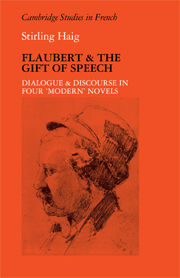5 - Bouvard et Pécuchet and the End of Dialogue
Published online by Cambridge University Press: 05 November 2011
Summary
“¿de qué voz original es el lenguaje el eco?”
(Guillermo Cabrera Infante, “La voz detrás de la voz”)The difference between L'Education sentimentale and Bouvard et Pécuchet would seem to mark the boundary between a nineteenthcentury confidence in fiction's signifying power, however ironically articulated, and an unmitigated rejection of the novel as a valid mimetic form. Indeed, Bouvard et Pécuchet appears to constitute an attack on all culture, and a recognition that the novel has reached an esthetic deadend. And, as if to repel once and for all the label of réaliste that he so loathed, Flaubert would seem to have written a deliberately non-referential work, one whose reading retraces its own composition, thereby referring readers to the 1,500 volumes that the author claimed to have devoured during his preparatory work. “The very writing of the book can be said to be its subject,” states Victor Brombert.
Yet the novelty of Bouvard et Pécuchet is not so great that it has not been constantly related, by virtue of its encyclopedism, to La Tentation de Saint Antoine, the work that Flaubert himself obsessively “retraced” three times during his lifetime. Bouvard et Pécuchet would be the modern counterpart of the Saint's story, and “aura les prétentions d'être comique” (1 July 1872).
The ties with L'Education sentimentale are nearly as strong, though.
- Type
- Chapter
- Information
- Flaubert and the Gift of SpeechDialogue and Discourse in Four "Modern" Novels, pp. 160 - 169Publisher: Cambridge University PressPrint publication year: 1986



